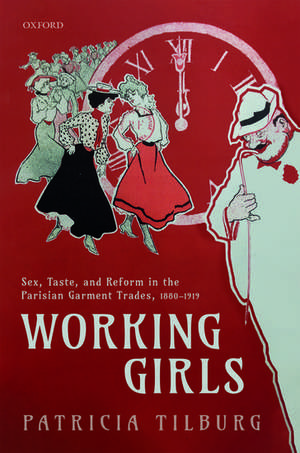Working Girls: Sex, Taste, and Reform in the Parisian Garment Trades, 1880-1919
Autor Patricia Tilburgen Limba Engleză Hardback – 5 noi 2019
Preț: 558.46 lei
Preț vechi: 740.44 lei
-25% Nou
Puncte Express: 838
Preț estimativ în valută:
106.88€ • 111.17$ • 88.23£
106.88€ • 111.17$ • 88.23£
Carte disponibilă
Livrare economică 13-19 martie
Preluare comenzi: 021 569.72.76
Specificații
ISBN-13: 9780198841173
ISBN-10: 0198841175
Pagini: 286
Dimensiuni: 162 x 241 x 23 mm
Greutate: 0.57 kg
Editura: OUP OXFORD
Colecția OUP Oxford
Locul publicării:Oxford, United Kingdom
ISBN-10: 0198841175
Pagini: 286
Dimensiuni: 162 x 241 x 23 mm
Greutate: 0.57 kg
Editura: OUP OXFORD
Colecția OUP Oxford
Locul publicării:Oxford, United Kingdom
Recenzii
Tilburg establishes the centrality of the figure of the midinette to both the fashion economy and the discourse of the working woman. Furthermore, she has opened a productive space to pursue these questions, to engage more deeply with the primacy of visual culture, and to examine working women across class lines. By treating her readers to a dazzling romp through the world of the midinette, the author has also shown how this exhilarating fantasy is inextricable from the labor history of the period and has provided an indispensable resource for future studies.
Working Girls makes a major and innovative contribution to several subfields of the historiography of modern France ... It also contributes significantly to both modern labor and cultural history, especially the history of taste in France ... This is an excellent book -- an engaging study that adds a lot to our knowledge of modern Paris and modern France, gender and labor history, and the history of taste.
This is the first work I know of that that discovers in popular culture not only a complete acceptance of women working outside the home, but a desire to shape them into something other than wives and mothers. Tilburg unveils a predominantly male bourgeois discourse about working-class women and traces its weight and pervasiveness in the French imagination. She then places that discourse into actual dialogue with its subjects who, in turn, appropriated their bourgeois-created image for their own ends. These handcraft workers emerge as heroines of French taste who provided a cultural counterpoint to bourgeois women's perceived decadence. Tilburg thereby succeeds in achieving the exceedingly difficult task of using their own words to give these women their proper place in history, one with which historians of culture, labor, gender, and European history will have to contend.
Working Girls makes a major and innovative contribution to several subfields of the historiography of modern France ... It also contributes significantly to both modern labor and cultural history, especially the history of taste in France ... This is an excellent book -- an engaging study that adds a lot to our knowledge of modern Paris and modern France, gender and labor history, and the history of taste.
This is the first work I know of that that discovers in popular culture not only a complete acceptance of women working outside the home, but a desire to shape them into something other than wives and mothers. Tilburg unveils a predominantly male bourgeois discourse about working-class women and traces its weight and pervasiveness in the French imagination. She then places that discourse into actual dialogue with its subjects who, in turn, appropriated their bourgeois-created image for their own ends. These handcraft workers emerge as heroines of French taste who provided a cultural counterpoint to bourgeois women's perceived decadence. Tilburg thereby succeeds in achieving the exceedingly difficult task of using their own words to give these women their proper place in history, one with which historians of culture, labor, gender, and European history will have to contend.
Notă biografică
Patricia Tilburg is James B. Duke Professor of History and Gender & Sexuality Studies at Davidson College. She is the author of Colette's Republic: Work, Gender, and Popular Culture in France, 1870-1914 (2009).
